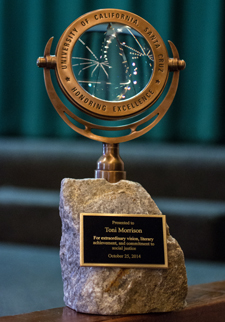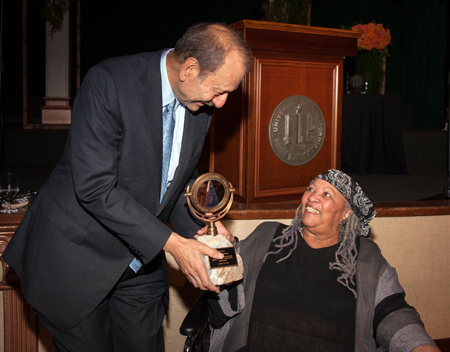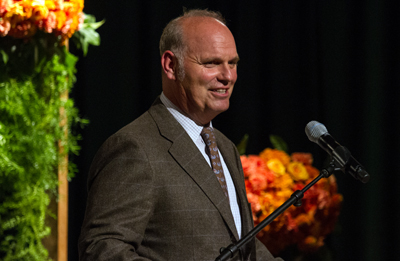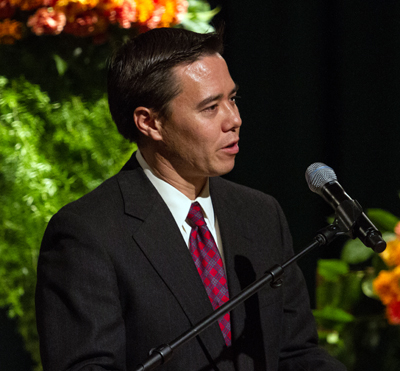Campus News
Founders Celebration recipients share commitment to social justice
Acclaimed author Toni Morrison’s appearance was a highlight of the 2014 Founders Celebration that also honored Professor Craig Haney, alumnus Mark Headley, and the Long family.





Editor’s note: Read an extended Q&A with Toni Morrison and Angela Davis.
Acclaimed author Toni Morrison believes evil characters are hogging the limelight in literature “while goodness sits in the audience and watches, assuming it even has a ticket to the show.
Evil is treated as part of a “thrilling intellectual journey,” while good characters are muted and good intentions are all too often dismissed as “stupid,” Morrison, 83, told a capacity crowd at the Rio Theater in Santa Cruz on Saturday (October 25).
Morrison was in town to deliver the Peggy Downes Baskin Ethics Lecture before heading to the Cocoanut Grove ballroom, where she accepted the UC Santa Cruz Foundation Medal. Her appearance was one of the highlights the 2014 UC Santa Cruz Founders Celebration.
Founders Celebration awardees
Also feted during the celebration were Craig Haney, professor of psychology and legal studies, selected by the Academic Senate to give the Faculty Research Lecture; Mark Headley (Stevenson ’83, politics and economics), winner of the Alumni Association Achievement Award; and the Long Family and Joseph and Vera Long Foundation, awarded the Fiat Lux Award for distinguished volunteer leadership and outstanding generosity to the campus since its founding.
Mistress of ceremonies was Teri L. Jackson (Stevenson ’77, politics), who spent many years as a trial attorney, and in 2002 became the first African American woman appointed to the Superior Court bench in San Francisco.
Chancellor George Blumenthal praised the winners for their courage, research, scholarship, and service.
Throughout his prolific career, Haney has written and spoken widely against the prevailing practices of incarceration in the United States. He said UC Santa Cruz and its commitment to social justice provides him the intellectual atmosphere to pursue his work.
Headley and his wife, Christina Pehl, recently established the Dorothy E. Everett Chair that supports the campus’s Global Information Internship Program (GIIP), which mentors students in information technology and social entrepreneurship.
Speaking for the Long family, Milton Long, Joseph and Vera’s grandson, said the family seldom responds to such invitations but did so because longtime professor Gary Griggs called and they remember the close collaboration between Joseph Long and Dean McHenry, UCSC’s founding chancellor.
Blumenthal called Morrison, winner of the 1993 Nobel Prize for Literature, and the 1988 Pulitzer Prize for her novel Beloved, “one of the greatest storytellers of our time.”
Horror and hope in Morrison’s work
Morrison’s books contain many horrific incidents. But in an interview prior to the talk, she said she takes care “never to leave a text with the reader hopeless or even helpless; certainly somebody in there has to survive in the atmosphere of goodness or love.”
Elaborating during her lecture, Morrison said forces of goodness, and acts of altruism in her novels have a strong impact on her stories. For her, a successful, impactful novel must have a protagonist “who learns something vital and insightful. I want to make sure that acts of goodness produce language.”
But Morrison made a clear distinction between effective and powerful “good” characters and sentimental depictions of good. In her most recent novel, Home, a group of women provide “unsolicited but necessary nursing care to a woman who spent a lifetime despising them.” They tell her to shut up when she cries out in pain – and yet they save her life. “There is nothing soothing about their words, just their deeds.”
Morrison used her own works as examples of literature that stand apart from novels–especially those written after World War I–that privilege evil while making fun of, or muting, good characters and good intentions.
As part of her exploration of goodness, Morrison also turned away from the world of imaginative fiction and looked into the aftermath of an horrific shooting of 10 Amish girls in 2006; in an expression of grace and goodness, the Amish community forgave the killer and refused to seek vengeance, only to be portrayed in the news media as “bizarre” for their restraint, she said.
Baffling theories of human goodness
While Morrison admitted to some confusion as she explored a baffling “bouquet” of theories about human goodness, the animal kingdom provided more clarity.
Examining the behavior of bats, ants, and other creatures help her look at the roots of altruism and test some of the prevailing theories about acts of self-sacrifice, and whether such behaviors are engrained or learned, or a survival mechanism that aids the collective, “A kind of brother to Darwin’s theory of evolution.”
To illustrate her point, she spoke of squirrels that call attention to themselves to spare others from predators, and ants that return to the bodies of dead ants and carry them off.
Morrison’s longtime friend Angela Davis, the scholar, activist, and UC Santa Cruz professor emerita, was on hand to introduce her, and to praise her for “re-imagining slavery as involving real people with important interior lives that are worth exploring.”
They have been friends since the early ’70s, when Morrison, while working as an editor at Random House, edited Davis’s autobiography, encouraging her to add cinematic touches and gripping scenes to her story.
After the talk, Morrison engaged in a dialogue with UC Santa Cruz humanities dean William Ladusaw, who shared selected questions from audience members, who expressed concern that historic figures are turned into mere symbols after they die. Morrison agreed; she said that it was one thing to lionize figures like Gandhi after they were gone, and another thing to support them through their “trouble” while they were alive.